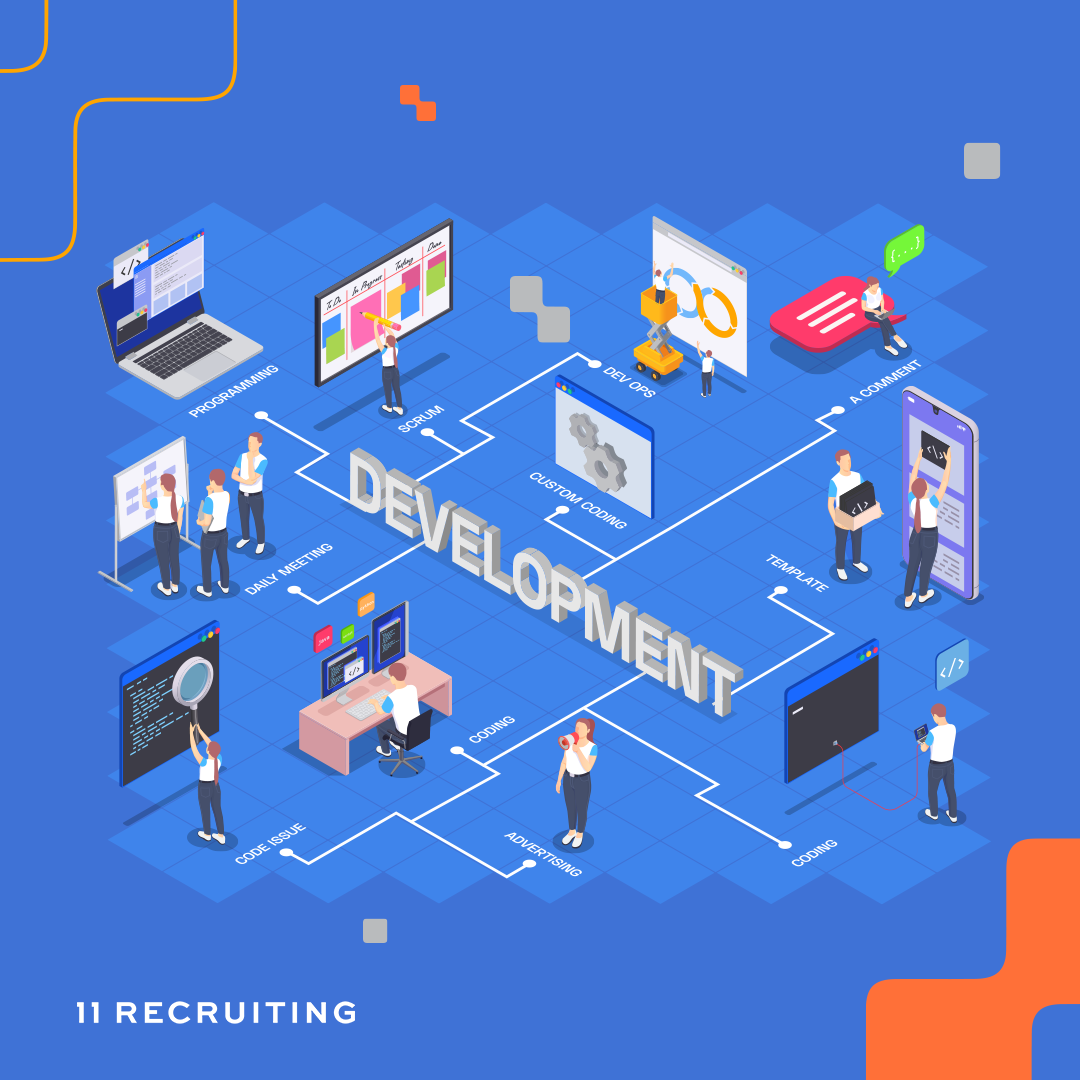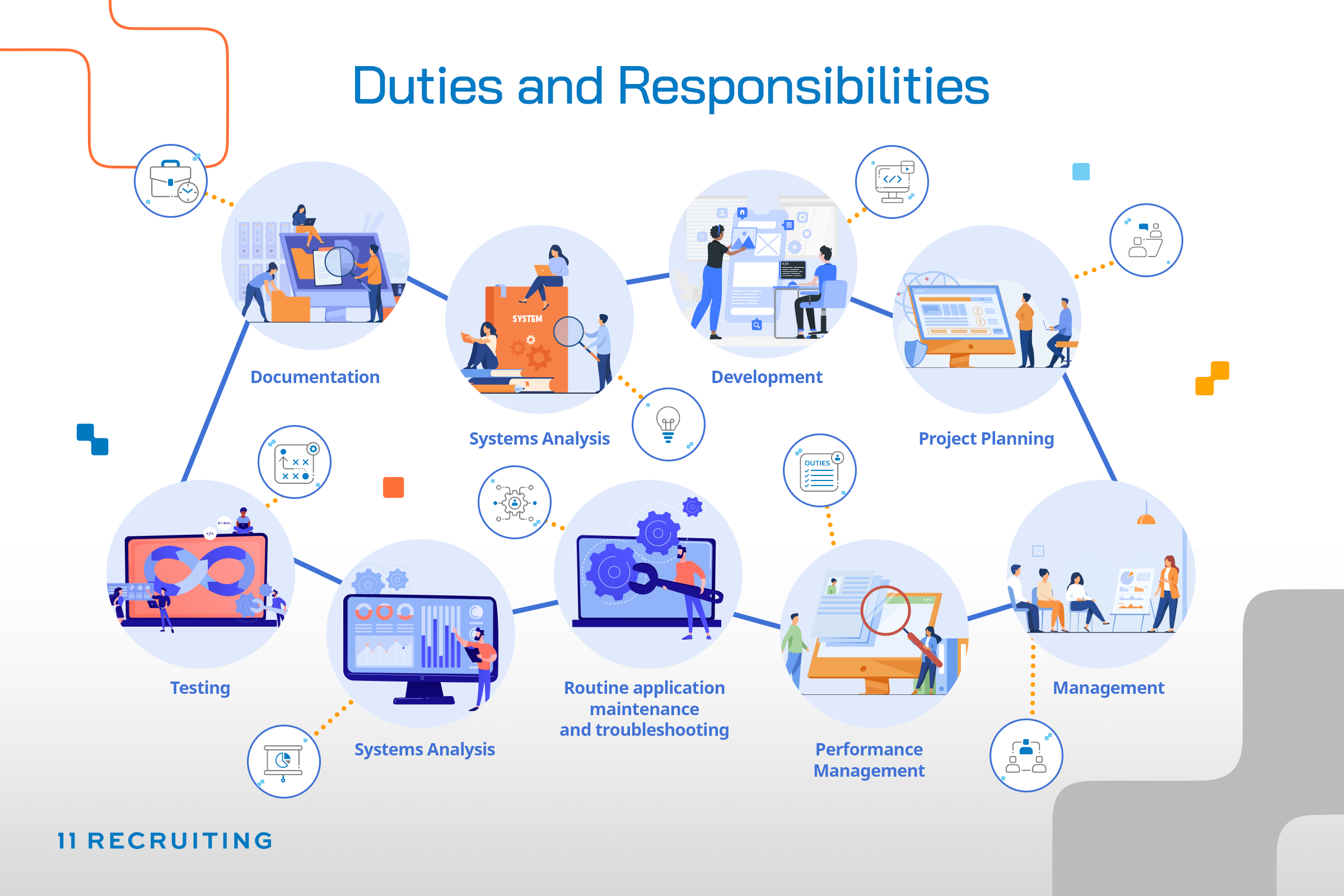
Blogs and articles aimed at teaching newbies ‘How to become a DevOps Engineer?’ have been circulating the internet for a while. However, most of them really just give us a head scratch for being so confusing. But, fret not! We are here to make things a little less complicated for you.
I’ll be explaining DevOps in a simple way – the roles and responsibilities, the skills required, their average salary, and more. That said, let’s first understand what ‘DevOps’ actually means!
DevOps Engineer Overview
If you’re familiar with portmanteaus like “brunch”, it makes it easier to recall DevOps as another fusion word for ‘Development’ and ‘Operations’. The field was essentially developed to bridge the gap between software development teams and IT operations.
DevOps engineers ensure greater transparency and interaction between development and IT operations. As a result, they build stronger collaborations, maximize productivity and meet the business goals of the organization.
DevOps is an intriguing career path with outstanding employment prospects and the field lets you work on creative projects. You can learn a wide variety of transferable skills in this sector.
The role requires you to simultaneously be a developer, a systems operator, and an automation specialist.
New to the DevOps industry?
The role is a senior position which is why it requires you to have substantial industry experience in development or operations.
However, if you are someone with little or no IT experience and expertise, here are a few tips that can help your journey in becoming a DevOps engineer:
- First and foremost, you may need a qualification in computer science with an emphasis on software development.
- You’ll also need to learn Amazon Web Services(AWS), Google Cloud Platform, Terraform, and Microsoft Azure, among other cloud technologies.
- You’ll need to develop your understanding of industry-relevant coding languages. Refer to the skills section below for this.
Although DevOps jobs doesn’t require extreme programming, it’s always better to have the basic knowledge of Linux, Git, Python, or Java. If you happen to know these programming languages along with cloud-based software, it would be easier to make a career jump into DevOps.
Duties and Responsibilities
Since the current workforce is dynamic and burgeoning, the career path required to become a DevOps engineer is pretty unclear as the field is constantly evolving.
The position is much more than just developers. They are the mediators who remove silos and smoothen work between the Dev and Ops teams.
Let’s explain the work of this position in a simpler way. Suppose we have a company office that is divided by a wall.

On one end of the wall, there are developers, and on the other, there are operations personnel. The developers spend 6–9 months coding before throwing it “over the wall” to the operations team and declare: “We’re done with the code! Make it run.”
The Ops team would then spend the next few weeks to find out how to make it work. Incoherency and inefficient communication between both teams would ultimately lead to chaos.
DevOps engineers solve this issue by tearing down this divisive wall. They facilitate communication between the two teams and help produce favorable outputs.
While the word “DevOps” can refer to a variety of positions, there are several duties that are shared by all of them:
- Documentation: The position writes server-side feature specs and does the documentation.
- Systems analysis: A DevOps engineer examines present technology and formulates strategies and methods for improvement.
- Development: They help in the developing, coding, fabricating, installing, configuring, and maintenance of IT solutions.
- Project Planning: They participate in project planning meetings that help the organization understand system alternatives, risk, impact, and costs vs. benefits. He also discusses operational needs and development projects.
- Testing: They identify methods for streamlining, and errori mitigation by testing code, procedures, and deployments.
- Deployment: They automate the deployment of updates and patches them into the production environment using configuration management software.
- Routine application maintenance and troubleshooting: They perform routine application maintenance to ensure that the production environment runs smoothly.
- Performance Management: DevOps engineers perform gap analysis to identify new solutions and enhance the way activities are taking place.
- Management: Depending on the size of the company, DevOps specialists may be responsible for managing a team of DevOps engineers.
Day-to-Day Tasks of the DevOps Engineer
DevOps do not follow the crowd; instead, they develop their own rules. Thus, the day-to-day life of a DevOps engineer is quite flexible and exciting.
However, according to their specialization, here are some tasks the position performs during the day.
- The DevOps engineer automates and refreshes IT infrastructure. They often produce recipes for building infrastructure required by the application teams.
- One of the most critical tasks of the position is to ensure that the Continuous Integration & Continuous Delivery (CI/CD) pipeline is running smoothly, which demands troubleshooting, evaluating, and resolving issues.
- This role involves developing dashboards for application and infrastructure monitoring.
Skills and Expertise
The DevOps position is varied, and people approach it from diverse perspectives. That said, the following are some of the skills that a DevOps Engineer should have.
- Communication Skills: Apart from being well-versed with technical elements, you must possess great communication skills, both verbal and written to support continuous delivery. Building a liaison between the Dev team and Ops team is essential, and it can only be done through effective communication.
- Problem-solving abilities: You should be able to detect faults or blockages in routine operations and procedures. You need to provide recommendations for improvements and perform adjustments to ensure that procedures meet expectations. You should be aware of agile working methods and have analytical and problem-solving abilities to offer changes and quickly resolve concerns.
- Professional Skills: You need to have strong management, organizational, project management, and time management skills. This is to ensure that processes are properly executed.
- Technical Skills: You’ll need to be familiar with:
- A variety of programs and scripting languages, such as :
- Java
- Javascript
- Python
- Ruby
- Perl
- Groovy
- Tools like:
- Git and GitHub
- Docker
- Kubernetes
- Jenkins
- Selenium
- Puppet, Chef, and Ansible
- Nagios
- A working knowledge of operating systems like:
- Linux
- Windows
- Mac
- A variety of programs and scripting languages, such as :
Breaking into DevOps
Although advanced jobs may require a bachelor’s or master’s degree in Technology or Computer Science, entry-level DevOps positions don’t require you to have a degree in any related field. However, a fundamental understanding of software is necessary. Knowledge of Oracle systems and script-friendly programming languages like Python or Ruby on Rails is valuable for getting started.
As there is no set professional path to become a DevOps engineer, any IT position may lead you to become one. You should have a CV that highlights any relevant experiences and soft skills mentioned in the previous paragraph.
Another wonderful way to jumpstart your career is by taking a bootcamp or doing courses/certifications related to the field. Additionally if you want to break into DevOps, you must also be keen to collaborate with others and have a yearning to learn.
DevOps Engineer Salary
DevOps Engineer is one of the highest-paying jobs in the world. However, the position’s salary is determined by a variety of elements such as company, abilities, geography, and so on.
The average DevOps engineer’s salary according to Glassdoor is $110,606 per year in the USA. In the United Kingdom, it’s £47,698.
Directions for Applying
For entry-level DevOps roles:
To get entry level jobs, you must have prior organizational experience. It might be an experience as a team leader or an assistant. For recent graduates, if you’ve managed a team in a college, it will help. Make sure to add these experiences to your CV.
For advanced DevOps roles:
For advanced positions, it’s much easier to break in if you have the relevant skills and expertise mentioned in the Skills and Expertise section above. Adding these to your CV will boost your chances of getting hired as a DevOps Engineer.
Speaking of application, if you’re interested in getting help from one, then take a look at Eleven Recruiting.
Frequently Asked Questions
Is being a DevOps engineer a stressful job?
Yes, DevOps jobs can be stressful as they are expected to familiarize and fulfill many IT roles. Being constantly up-to-date with the latest changes in technology is also another stressor a DevOps engineer is required to maintain.
Is DevOps a good career in 2022?
Yes, DevOps engineering is a good career option for 2022 as it has a promising projection. IDC (International Data Corporation) estimates that the market will reach $6.6 billion by 2022, bringing up a plethora of DevOps job opportunities.
What are some other jobs similar to DevOps engineers?
Jobs like Linux Administrator, Linux Systems Administrator, Site Reliability Engineer, and Release Engineer are some jobs similar to DevOps engineer. Having experience in these fields makes it easier for someone to jump into a DevOps role.

